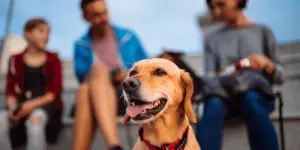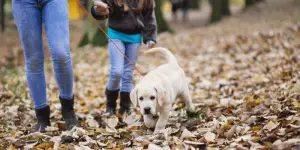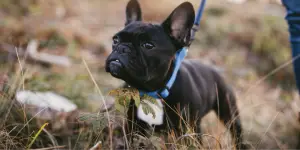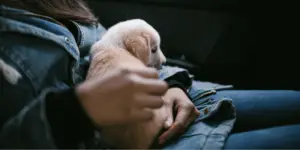
Week 6 of Puppy Development – What to Expect
Puppies can certainly be a handful, particularly in the first couple of months of their life when they are learning about the world around them. But at 6 weeks old, your puppy is still a little too young to leave their mother and siblings.
However, if you’re caring for an orphaned pup or are curious about your pooch’s development while they’re living with their current owner, our handy guide will help you know what to expect.

The Vet's top tip - 6 week old puppies
"Now is a critical age for your pup to experience the world in a positive way. Encourage positive social interactions with people and other pets.
Remember, it is about the quality of the experiences, not the quantity. Introducing your young pup to a badly behaved adult dog or loud toddler is not good socialisation."
- Dr Linda Simon MVB MRCVS
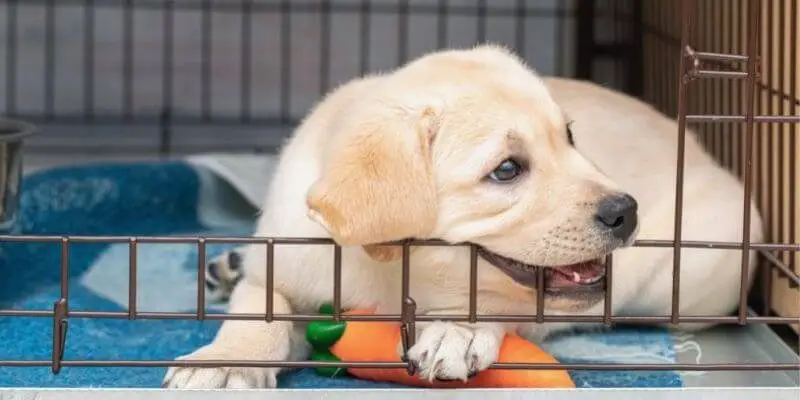
What age should you take home your puppy?
The best age for a puppy to go to their new home is between 8 weeks to 12 weeks. Most reputable breeders in the UK will refuse to sell puppies younger than 8 weeks as it can cause socialization issues later down the line.
Puppies need to stay with their mother and siblings until at least 8 weeks of age to help them understand the right way to behave and socialize around other dogs. These crucial life lessons cannot be taught by a human, which is why puppies who leave their mother and littermates too early can grow up to be fearful, anxious, or aggressive adults.
A 6-week-old puppy is far too young to go to a new home as they still need their mother’s care and attention.
Additionally, the weaning process for puppies typically begins at 3 to 4 weeks old and lasts until around 8 weeks old, so a 6-week-old pup will still be nursing.
If a dog breeder says they can let you take a puppy home younger than 8 weeks old, that’s a big red flag – you might want to look for a more credible breeder.
Additionally, before you bring your new companion home for the first time, make sure you’re prepared and have everything you need to give your pooch the best care.

6-week-old puppy training
While you can start training your puppy at 6 weeks old, you should limit your expectations as they are still a little too young to grasp commands and certain concepts. The best age to start training and housebreaking a puppy is between 7 to 8 weeks old.
We have a separate guide on 8-week-old puppies, which includes some tips on how to crate train and potty train your pooch here if you want to get a headstart on teaching your puppy the basics!
Bear in mind that puppies have extremely short attention spans, so you’ll need to keep sessions short and simple. Opt for basic commands such as “sit” and “stay”, making sure to praise and reward your pooch when they are doing a good job.
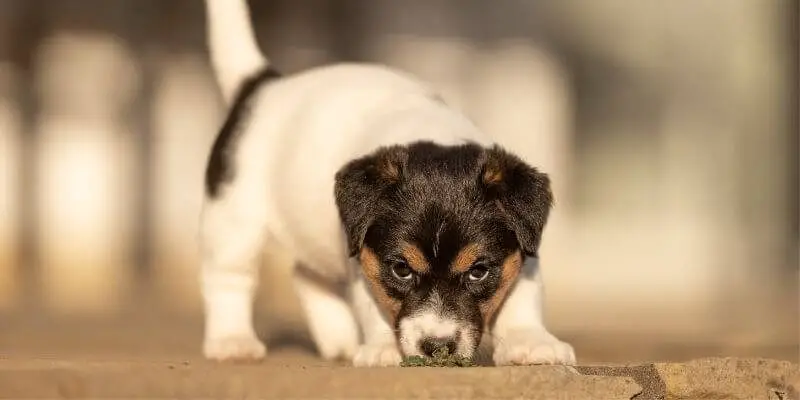
6-week-old puppy behavior
A 6-week-old puppy acts a lot like a toddler – they’re playful, curious, energetic, and a little mischievous. As they explore their surroundings, don’t be surprised if you spot your puppy nibbling and biting objects.
Puppies begin teething at around 3 weeks old, so it’s a good idea to have plenty of chew toys available for them to sink their teeth into. Discourage your puppy from biting your hands – it might be cute while they’re little, but it won’t be as they get bigger.
While puppies are incredibly lively at this age, they are also pretty sleepy – learning new experiences is hard work! Puppies sleep a lot at 6 weeks old, often in the strangest of positions, so it’s not uncommon for them to be causing mayhem one minute, then in a deep slumber the next
6-week-old puppy sleep schedules
All puppies sleep a lot, but younger pups will need to get a lot of shut-eye in order to develop healthily. Young dogs need to rest more than adult dogs to replenish their energy levels and process new experiences, so don’t be alarmed if your pooch is asleep more than they are awake!
The majority of puppies sleep between 18 to 20 hours a day, particularly when they are on the younger side. It’s important not to disturb your puppy while they are sleeping as they need ample napping time to grow up big and strong.

6-week-old puppy feeding
At 6 weeks old, your puppy will be almost fully weaned, with most of their nutrients coming from solid food. The weaning process usually starts once your pooch is 3 to 4 weeks old and ends around 7 to 8 weeks of age.
Puppies have different dietary needs than adults, so you’ll need to feed them good-quality dry or wet food designed for their life stage. Feeding your puppy adult food can inhibit their growth and development as it doesn’t contain the correct level of protein and nutrients.
Additionally, make sure you feed your puppy a dog food targeted for their breed. Small breeds grow quicker than large breeds and usually reach their adult size at around 12 months old. Large breeds, on the other hand, can take up to 2 years to reach their adult size.
At between 6 to 12 weeks old, you should be feeding your puppy 4 times a day, though some pups may need up to 6 meals a day. Around 20g of food per kg of body weight is usually sufficient. For instance, if your puppy is 2kg in weight, you’ll need to feed them 40g of food daily.
6-week-old puppy socialization
If your 6-week-old puppy is still with their breeder, they will begin learning proper dog etiquette from their mother and siblings. However, if your pooch is orphaned and you don’t have other dogs in your home, socialization will be more difficult.
Socializing your puppy as soon as possible is key to raising a confident, independent dog, so it’s crucial that you expose your companion to new sights, sounds, smells, etc, from a young age.
However, before you take your puppy to public spaces and let them meet other dogs, you’ll need to make sure they’ve been fully vaccinated. Puppies can be vaccinated as early as 4 weeks to 6 weeks old, but between 8 to 10 weeks is more common. The second vaccination should be given 2 to 4 weeks later.
Speak to your puppy’s breeder to check whether they’ve had their vaccinations so you know if you need to make an appointment with your vet.
Subject your puppy to as many stimulants as possible, such as stairs, loud noises, strangers, vacuums, being groomed, wearing a harness and leash, etc. Be sure to reward your puppy with praise and treats so they view the new experiences as something positive!
6-week-old puppy appearance
Your puppy’s appearance at 6 weeks will differ depending on their breed, though most pups will look like miniature versions of their adult counterparts.
Your puppy should have all their deciduous (baby) teeth at this age. Once they are around 12 weeks of age, these teeth will begin gradually falling out and be replaced with permanent teeth.
6-week-old puppy schedule
Dogs thrive on routine and consistency, so it’s a great idea to create a daily schedule for your puppy and keep to it. That way, they’ll know what to expect each day. To give you a general idea of what you should be doing with your 6-week-old puppy (and when to do it!), here’s a sample schedule.
Early morning: Let your puppy outside to relieve themselves to kickstart the housebreaking process. It’s likely that you’ll still need to use puppy training pads, so make sure you place them around the house, gradually moving them towards the backdoor.
Breakfast: Feed your puppy their first meal of the day. Leave the bowl down for a maximum of 15 minutes, then remove it until the next mealtime. Make sure your puppy has access to fresh, clean water.
Potty break: Take your puppy outside again, then set some time aside for playing or begin teaching them a few simple commands. Before you leave for work or run some errands, let your pooch outside again.
Mid-morning: The remainder of the morning is a great time to let your puppy nap, even if you’re at home.
Noon: Repeat the morning routine – potty break after waking up, lunch, then another potty break. You can squeeze in some bonding or training time, then let your pooch take an afternoon nap.
Mid-afternoon: After your puppy has woken up, take a trip outside, then some more playtime or training. You can then feed your puppy their third meal of the day, making sure to go outside for a bathroom break afterwards.
Dinner: Try to schedule your puppy’s mealtimes around yours. While you’re preparing your food, you can feed your pooch their fourth meal, then let them play with a chew toy as you eat.
Evening: It’s time for another trip outside. Fit in some more bonding with your pup, then settle them down for the night so they’re not pent-up when it’s time for bed. For example, keep the TV on low and dim the lights if possible.
Bedtime: Stick to a consistent bedtime to make housebreaking easier in the future. This will also help your puppy naturally calm down around their bedtime. Take them to their crate or sleeping area, but make sure you take them outside to relieve themselves beforehand.
Night: At 6-weeks-old, your puppy will need to be taken outside a few times over the course of the night to use the bathroom. Set an alarm and make sure you place a training pad in their sleeping quarters to prepare for any accidents
Final thoughts
It won’t be long until your puppy is older enough to bring home (just a couple more weeks left to wait!). Hopefully, our guide helped you understand your pooch’s development while they’re staying at their breeder or what to expect if you’re caring for an orphaned puppy.
Remember, reputable dog breeders never let their puppies leave home at 6 weeks old. If a breeder tries to persuade you to take a puppy before they are 8 weeks of age, they are not trustworthy and don’t have the dog’s best interests at heart.
Related puppy development stages
References
- https://www.akc.org/expert-advice/nutrition/how-many-times-a-day-should-a-dog-eat/#:~:text=For%20the%20first%20few%20months,twice%2Da%2Dday%20feedings
- https://www.rspca.org.uk/adviceandwelfare/pets/dogs/health/vaccinations#:~:text=Puppies%20are%20typically%20vaccinated%20at,at%206%20or%2012%20months
- https://www.akc.org/expert-advice/training/setting-schedules-and-developing-a-routine-for-your-new-puppy/
- https://wagwalking.com/lifestyle/dog-ownership/puppyhood-what-to-expect-at-6-to-8-weeks
- https://www.thesprucepets.com/puppy-development-part-1-2804676
- https://yourdogadvisor.com/6-week-old-puppy/
- https://www.akc.org/expert-advice/puppy-information/best-age-bring-puppy-home/
- https://pets.thenest.com/training-6-week-old-puppies-4198.html

Written by: Joshua Gordon
Head of Research and Editorial, Joshua has over 7 years of experience as a finance and automotive research consultant. He is a childhood pet owner and dog enthusiast.



